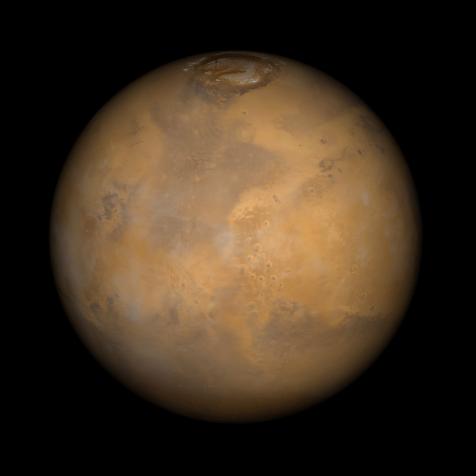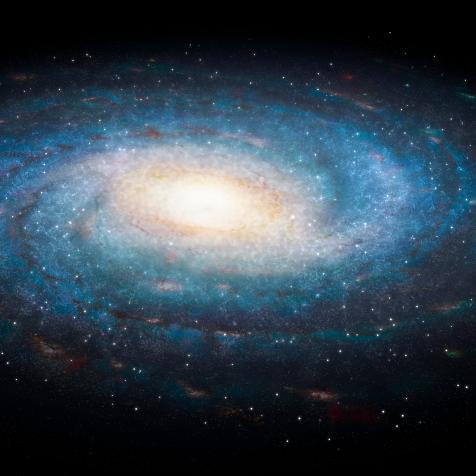
Getty Images/Bernt Ove Moss/EyeEm
9 Things That Make Earth the Perfect Place for Life
There are a few key ingredients are needed for life to exist.
It's not too surprising that the Earth is so hospitable to life — we would never have evolved enough to wonder about it if it weren't. But when you start to look at all of the things that have come together in just the perfect way to support plants and animals, it gets a little mind-boggling. It's not just about air, water, and distance from the sun. Here are the nine ingredients for a habitable planet.

Shutterstock
The Recipe for Life
Whenever astronomers announce the discovery of an "Earth-like planet," they're usually talking about planets with roughly Earth-like gravity that are close enough to their star to be warm but not hot and that may (or may not) have liquid water. But there's a whole lot beyond those three must-have ingredients that makes Earth special. Here's an (incomplete) roundup:
- The moon: The Earth has a slight tilt and teeters like a top as it spins, which can cause drastic shifts in climate over the course of thousands of years. But because of the moon's stabilizing effect on our orbit, our climate is a lot more steady. Plus, the moon causes the tides, and some biologists think life began in tidal pools.
- Stable rotation: There's no reason to think that a planet without a stable rotation would be completely inhabitable (actually, some people think such "eyeball planets" could be our best bet for aliens), but the regularity and frequency of day and night on this planet go far to prevent extreme temperatures and encourage life.
- A magnetic field: Our planet is blessed with a strong, stable magnetic field, which staves off the cosmic rays and solar flares that would otherwise fry the planet every now and then. It's also tied up with the next must-have feature on the list ...
- Dynamic geology: The cloud of gas and dust that eventually coalesced into the Earth contained enough radioactive elements to keep the core of the planet churning merrily for billions of years. Without that motion, there wouldn't be a magnetic field at all.
- Atmosphere: Of course, we can't discount the importance of the ozone layer. Back in the very early days of life, plant-like organisms unknowingly made way for animal life by filling the atmosphere with oxygen. That high-altitude layer of gas shielded early animals from lethal radiation.
- Isolation: Venus and Mars are close to the Earth, but our solar system as a whole is in the middle of nowhere. Because we're far from the major spiral arms of the Milky Way, we're in a lot less danger of running afoul of some greater star's gravitational pull (among other hazards).
- Long-lived sun: Our sun is a yellow dwarf, a relatively rare type of star that's both small and stable. It also has a long life, and probably won't start to fizzle out for another five billion years or so. Larger stars generally burn hotter and die sooner, while smaller stars have a tendency to spit out enormous plumes of radiation.
- Plenty of time: The sun has about five billion years left, and the Earth itself is around four and a half billion years old. But life only arrived in that last half-billion. We're here because our planet was sturdy enough to last until the first signs of life appeared.
- Gas-giant neighbors: Sure, the sun and moon are great, but there's another soldier on the battlefield to help make Earth habitable: Jupiter. In general, gas giants tend to clump up near their home stars. But because they're toward the outside of our solar system, their intense gravity conveniently catches wayward asteroids and comets, making events like the one that killed the dinosaurs a rarity.
Rare or Mediocre?
These are just a few of the items on the long list of features that make Earth more habitable than the average planet. And the fact that the list of essential features is so long might suggest that life is incredibly rare in the universe, or even that ours is the only planet that satisfies all of the necessary conditions. In reality, there are two concepts at play here, although they seem to be mutually exclusive. Call it the "rare Earth" hypothesis versus the "mediocrity principle" hypothesis. The first says that the conditions that have led to life on Earth are so finicky and uncommon that there probably aren't a lot of other planets that meet all the criteria. The second says that if you choose something at random from a set of many other objects, it's more likely to be a middle-of-the-road example of the group than representative of one of the group's extremes. In other words, there is probably another Earth out there just because it's statistically more likely that our planet is like other planets than unlike them.
The problem with the mediocrity principle is that the Earth isn't chosen randomly from all of the planets in the universe. In fact, our planet might be one of the extremes, if only the extremes can actually support life. Marveling that the planet that we happen to live on also happens to be very well suited to life is a bit like marveling that polar bears live in a place where their white fur can blend in with the snow — they didn't "happen" to evolve in a snowy environment just like we didn't "happen" to show up in a place that's well-suited for life. Still, the foundational belief behind the mediocrity principle is probably true: There's nothing about this particular planet or this particular star that makes it better for supporting life than others that have the exact same hospitable circumstances.
This article first appeared on Curiosity.com.


















